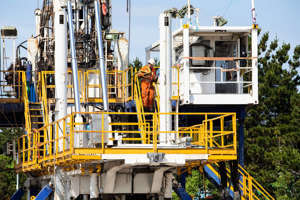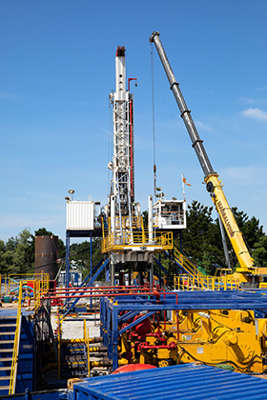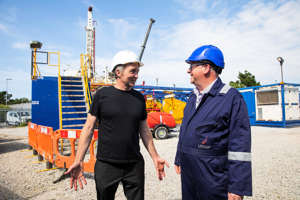Heat can be pumped from underground and used to provide electricity and heating for homes. But lithium can also sometimes be extracted from groundwater. A plant in British Cornwall recorded high concentrations of lithium.
© Johnny Weeks / TT
The bedrock of Cornwall, the southwestern corner of the United Kingdom, is made of hot, lithium-rich granite. Now the Geo Cubed Consortium is investing in extracting both energy and lithium from the rock.
Geothermal Engineering, one of two companies in the consortium, is building the UK’s first deep geothermal power plant, United Downs, near Redruth.
Two deep wells were drilled here in 2019. According to the consortium, one of them is the deepest and warmest ever drilled in the UK, with a depth of just over 5 km and a temperature of 195 degrees Celsius.
Water contains 250 mg of lithium per liter
Tests are currently underway in the facility. In 2022, it will supply electricity and heating.
But the hope is that the facility will have a third use area. It will produce lithium, the necessary metal in lithium-ion batteries.
© Provided by NyTeknik
The United Downs facility in Cornwall, UK, will provide electricity, heating and lithium. Photo: Johnny Weeks/TT
The idea is that the hot water still pumped out of the rock must be separated from its lithium compounds before it is returned back down into the rock.
Such plans exist at various stages, for example, in France, Germany and the United States. But geothermal engineering recently reported world record concentrations of lithium from the Cornwall plant.
According to third party measurements, the geothermal water contained more than 250 mg of lithium per liter. It’s the highest concentration ever detected in geothermal fluids anywhere in the world, reports the News Service Think Geoenergy.
The pilot plant will save ten tons of lithium per year
The United Downs plant is believed to have the capacity to produce 1,500 tons of lithium per year, according to the news service. uractive. But Geothermal Engineering already has plans to open four more geothermal plants at various locations in the UK by 2026. In all of these, tests will be carried out to check if the lithium can be extracted.
The actual extraction of lithium should be done with the help of filters. Since energy is also extracted from pumped water, it is possible to produce lithium with no net emissions, according to cube geo.
French company Geolith provides technology to extract lithium in Cornwall. This process is called direct extraction and work will begin on a pilot scale at the end of March 2022. So far, the company has reached 95 percent of extraction, geothermal engineering founder Ryan Low said, Euro Active.
© Provided by NyTeknik
Ryan Low (left), founder of geothermal engineering, talks about drilling director Pete Jones. Photo: Johnny Weeks/TT
The pilot plant will treat 140 cubic meters of geothermal water. It is expected to have the capacity to produce ten tons of lithium per year. The hope is that the results will provide enough information to develop a commercial lithium plant in Cornwall.
Today, lithium is extracted in two ways, either by mining the ore in mines, or by pumping lithium-rich salt solutions from bedrock and allowing them to evaporate in large pools. The largest producers are Chile, China, Argentina and Australia.
It is one of the important raw materials in the European Union
American research institute NREL, National Renewable Energy Laboratory, recently observed Direct extraction of lithium from geothermal water makes it possible to produce lithium in a more sustainable manner than current methods.
The need for lithium is expected to increase sharply in the next few years. according to and the study From the European Commission’s Joint Research Center, demand is expected to be about 20 times higher than it is today in the EU in 2030, and 60 times higher than it is today in 2050.
Last year, lithium List I: s An important raw material.

“Extreme tv maven. Beer fanatic. Friendly bacon fan. Communicator. Wannabe travel expert.”











More Stories
Brexit brings economic uncertainty – Finland worst hit in the long run – Hufvudstadsbladet
Britain wants closer ties with the European Union.
Britain may already be out of recession